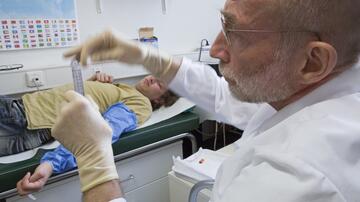Chronic hepatitis B: Development of a thermostable therapeutic vaccine
Around 300 million people are living with a chronic hepatitis B virus (HBV) infection and currently there is no cure for the disease. A team of researchers around DZIF professor Ulrike Protzer from Helmholtz Munich and Technical University of Munich (TUM) are currently investigating a new therapeutic vaccine against HBV, called TherVacB, a vaccine that may allow to cure chronic hepatitis B. However, the vaccines need to be heat-stable, especially for the use in low- and middle-income countries or hard-to-reach areas. A team of Helmholtz Munich researchers now identified an optimal formulation to maintain stability of HBV vaccine components.
Having chronic hepatitis B increases the risk for patients to develop liver failure, liver cancer or cirrhosis—a condition that permanently scars the liver. A therapeutic vaccine might help to cure patients. The consortium of leading virologists, immunologists and physicians specialized in treating viral hepatitis, will use the newly designed vaccine as an immunotherapy to cure HBV. TherVacB will be evaluated in a clinical trial, starting in 2023 and conducted in Europe and Africa.
However, there is a major challenge in vaccine development: vaccines need a cold chain for transportation and storage to ensure their efficacy. Maintaining the cold chains at a specific temperature range can be difficult especially for resource-constrained countries and may result in vaccine damage or wastage. This problem can be alleviated if vaccines are stable at higher temperatures.
Resistant to heat exposure
To facilitate the distribution of TherVacB worldwide without the necessity of a cold chain, first authors Dr Julia Sacherl and Dr Anna Kosinska as well as their colleagues developed thermostable components of the vaccine. The results were now published in the Journal of Hepatology Reports. The researchers could show that the heat-stable vaccine components are well tolerated and allow inducing immune responses and control the virus in preclinical mouse models even after long-term exposure to high surrounding temperatures.
The findings of the researchers are a crucial step in the development of TherVacB. In addition, the discovery will facilitate vaccine application worldwide, not only reducing the costs of vaccination campaigns but also easing the application of the therapeutic vaccine. A great benefit for many hepatitis B patients worldwide.
Source: Helmholtz Munich




